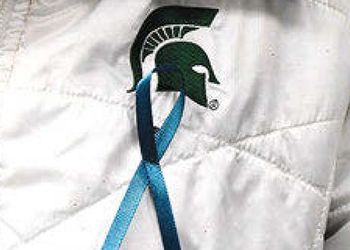The Danger of Unquestioned Authority

The Danger of Unquestioned Authority
The news of Larry Nassar’s predatory behavior shocked many who knew him. The doctor had groomed an entire community, carefully cultivating an image of trust and kindness.
March 21, 2018Women are told to look out for predators at night, to carry a flashlight, and always take note of our surroundings. We’re never told what to do when a predator is right in front of us, in our community, telling us he’s our friend.
I knew Larry Nassar. I knew the person he fooled us all into believing he was. As a pillar in my hometown community, he manipulated people into trusting him, caring for him, and defending him. He spent countless volunteer hours helping my high school classmates by assisting with injuries and helping athletic trainers at sporting events. He groomed us to believe he was Superman.
When Nassar was arrested in the fall of 2016, I was taken by surprise. How could someone who appeared to be a positive example of the community inflict so much harm?
As more women started speaking out, it was clear that his facade was crashing and burning. The age-old saying still rings true: ‘Where there is great power lies great responsibility …’ and great danger of abusing power. Abusers like Harvey Weinstein, Matt Lauer, and Jerry Sandusky had power and influence, and they hid their predatory behaviors behind credentials.
Larry Nassar was cut from the same cloth. He had a protective inner circle of professionals, countless young athletes who relied on him, and a gentle appearance that made everyone think he wouldn’t hurt a fly.
The women that Nassar abused were told he was the best of the best; they were lucky to be in his presence. Their predator did not attack them in the middle of the night. He gave them gifts, wished them good luck, and rooted for their success.
There’s great power among the authority figures that many of Nassar’s survivors tried to report to, and they completely failed. There’s also great power among those who were in charge of Nassar’s professional positions, and they, too, failed to uphold their responsibilities. Nassar’s former boss, Dr. William Strampel, disgustingly abused his power and took advantage of women as well.
Students deserve better. Women deserve better. We shouldn’t have to wonder, “Is this the professor who’s going to stalk me? Is this the boss who’s going to sexually harass me? Is this the doctor who’s going to abuse me?”
This is not paranoia. This is real, and it’s in every town, city, state, and workplace.
There are so many people at MSU and in our communities from whom we can draw inspiration: survivors who courageously come forward; students who strive to solve problems facing our society; and the staff, faculty, and professors who care deeply about doing the right thing.
Our school colors shouldn’t represent shame, abuse, and poor leadership. I want to be proud of MSU and the positive opportunities I’ve been given through my education and community.
My hope is that, in the not too distant future, I will be able to be proud of the positive strides MSU will take. MSU should be a good example. Not a horrible warning.
Allison Bertram, ’18, graduated with a bachelor’s degree in professional writing from the College of Arts and Letters, and is an editorial assistant for Spartan.
Contributing Writer(s): Allison Bertram, ’18







